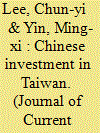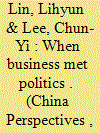| Srl | Item |
| 1 |
ID:
154229


|
|
|
|
|
| Summary/Abstract |
Cross-Strait economic activities are no longer unidirectional. The Taiwanese government opened the doors to Chinese investment in 2009. This paper addresses the following crucial question: What is the impact of Chinese investment on Taiwan’s high-technology industrial development? Two further questions immediately follow: Will Chinese investment put Taiwanese industrial development at risk? Will an influx of Chinese investment lead to a turning point for Taiwanese industry? The paper first reviews Chinese investment in Taiwan under the framework of the Economic Cooperation Framework Agreement (ECFA) and then explains why we have chosen to focus here on the high-technology industry in Taiwan. It then outlines the main elements of Chinese outward foreign direct investment (OFDI) before seeking to answer the above research questions. Fieldwork for this paper was conducted from December 2014 to March 2016. Interviewees include Chinese investors, along with consultants from a Taiwanese institute created to promote industrial development.
|
|
|
|
|
|
|
|
|
|
|
|
|
|
|
|
| 2 |
ID:
119215


|
|
|
|
|
| Publication |
2013.
|
| Summary/Abstract |
After more than half a century's separation, interaction between China and Taiwan has increased and has progressively changed from a politico-economic interaction to a more civic interaction. Scholars working on cross-Strait relations have recently begun to pay attention to the civic influence of Taiwanese businesses on the relationship. Some emphasize the importance of sub-governmental interactions in the process of cross-Strait integration. Others assert that Taiwanese businesses can exercise economic leverage to constrain the Chinese government in cross-Strait policymaking. These scholars stress bottom-up processes by observing current phenomena, then deducing the emerging pattern of cross-Strait relations that may be influenced by business activities. Taking account of changing trends in scholarly discussions of the cross-Strait relationship, this special issue of China Information presents current research in this field. Unlike studies on top-down processes that affect political and economic interactions between China and Taiwan, several contributions in the special issue highlight bottom-up mechanisms affecting such interactions by examining the identity of Taiwanese businesspeople and migrants, as well as the activities and implications of Taiwanese charitable organizations operating in China. This issue focuses not only on the impact of China on Taiwan, but also the impact of Taiwanese investments, migrants, and exports on Chinese society.
|
|
|
|
|
|
|
|
|
|
|
|
|
|
|
|
| 3 |
ID:
154155


|
|
|
|
|
| Summary/Abstract |
Since 2008, the Taiwanese business group Want Want, having made a fortune in China, has returned to Taiwan to buy a major media group and attempt to exert political influence on Taiwanese society. This paper analyses the rise and rationale of this new type of media investor in the light of the business-government relationship under China’s model of state capitalism. According to the analysis developed in this paper, when China needed foreign investment in the early 1990s, Taiwanese investors were warmly welcomed by the Chinese government, which provided Taiwanese businesses with tax incentives at that time. After 2000, however, when not only domestic Chinese entrepreneurs emerged but also more non-Chinese investors entered the Chinese markets, Taiwanese businesses realised that the investment environment had become much more competitive, so they had to work hard on building ties with Chinese officials. Under these circumstances, Want Want bought into media in Taiwan as an asset to be used in order to build social ties with the Chinese government, but in doing so, Want Want has also triggered resistance from Taiwanese civil society. Future researchers and regulators can continue to watch and define this new type of investment, which has become increasingly significant in this region.
|
|
|
|
|
|
|
|
|
|
|
|
|
|
|
|
| 4 |
ID:
085027


|
|
|